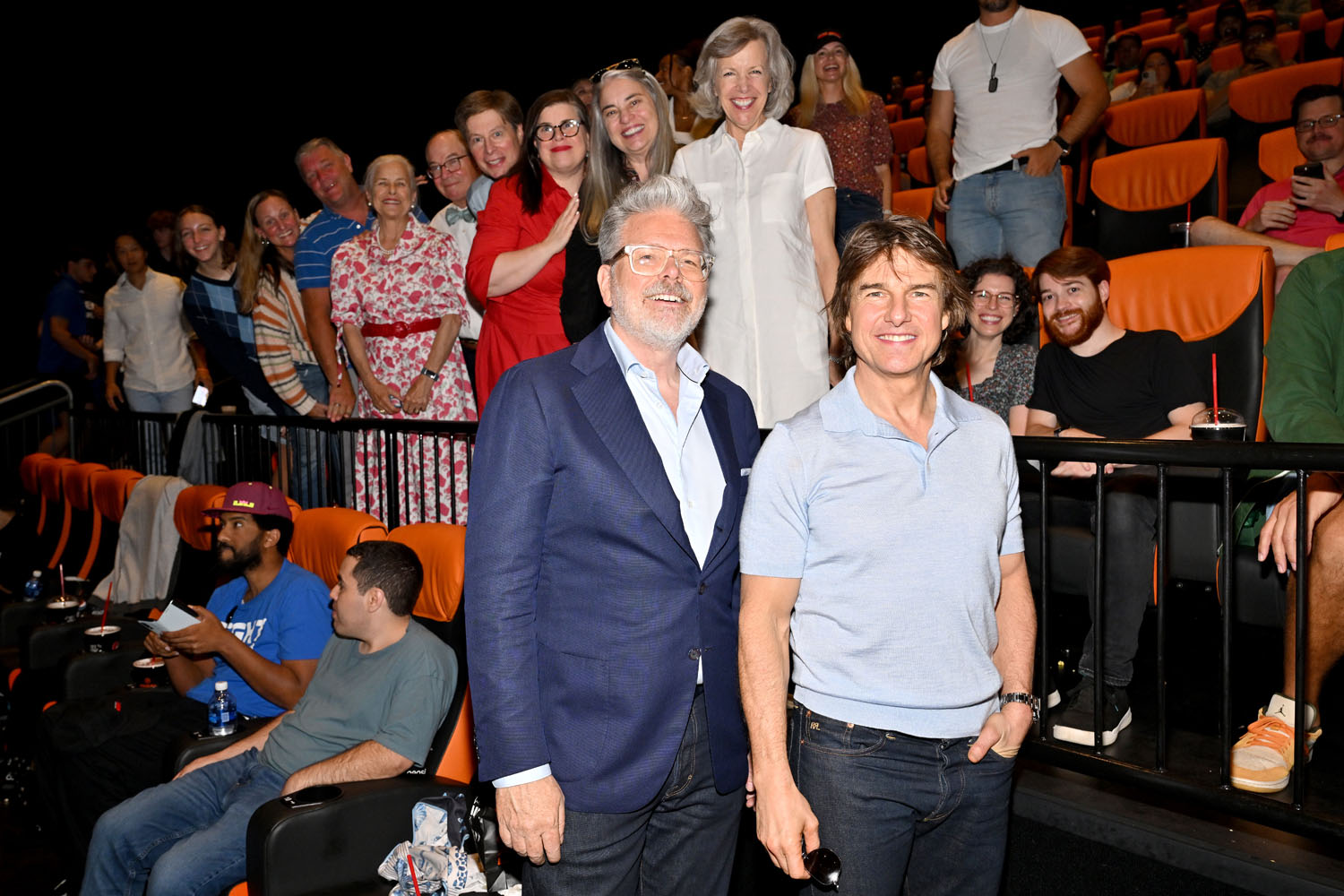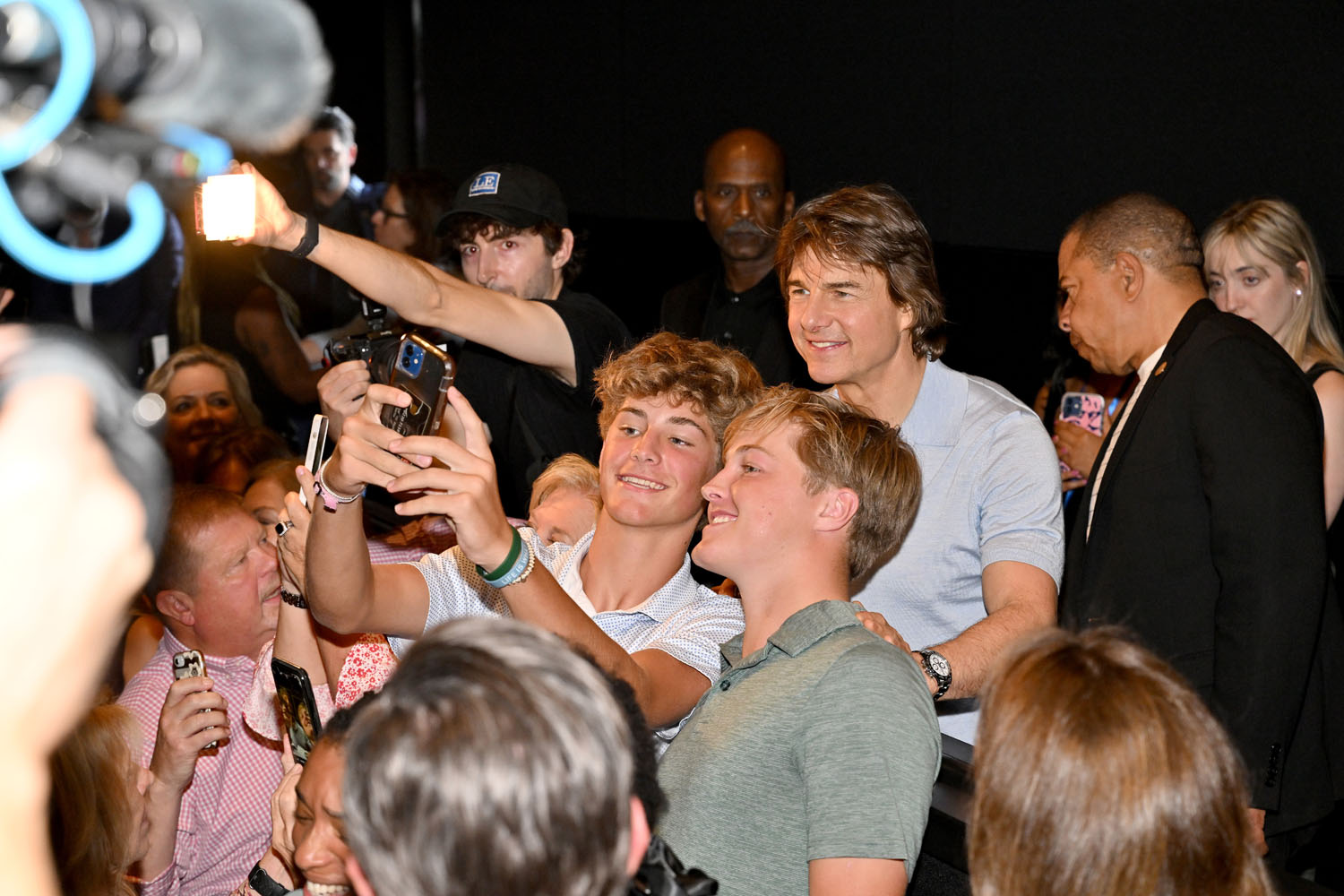Tom Cruise in Mission: Impossible – Dead Reckoning Part One



The Mission: Impossible movies have never been about much beyond impossible missions and Tom Cruise’s devotion to increasingly life-threatening stunts, but ever since filmmaker Christopher McQuarrie took over directing duties—he also co-writes the films—with 2015’s Mission: Impossible – Rogue Nation, there has been a halfhearted effort to inject some sense of thematic shape into these films (I say “halfhearted” because theme is never really the point, but an effort was made nonetheless). Mission: Impossible – Dead Reckoning Part One is the clearest distillation yet of Christopher McQuarrie’s driving thesis as a filmmaker: that only one man can save the world, and that man is Tom Cruise.
Once again directed by McQuarrie and written by McQuarrie and Erik Jendresen, Dead Reckoning encompasses the best of the M:I films—Cruise’s intensity and sincerity as an actor, death-defying stunts, an overall commitment to practical stunt work, glamorous international locales, cool, sexy ladies being sexy and cool—but also the worst of the M:I films—overstuffed plots, increasingly internecine spy-on-spy politics, and most prominently, a deeply regrettable tendency to fridge women for Ethan Hunt’s motivation. That has been an issue since literally the first film, and on this front, Dead Reckoning is egregious. But Dead Reckoning also introduces a confounding new element to the M:I franchise, which is a truly astounding amount of close-up magic. There is, like, an entire magician’s worth of close-up magic in this film.
Dead Reckoning utilizes a cold open in which a Russian submarine is sunk, and everyone aboard killed, when a prototype artificial intelligence goes rogue. The Macguffin driving the plot is a cruciform key that opens…something…and does…something. No one really knows what the key opens or what that locked thing does, but everyone knows it somehow pertains to controlling “The Entity”, the label given to the rogue AI. There is simply no way to make AI look cool, and Dead Reckoning does not solve that problem, casting The Entity as a screensaver. To make the threat more palpable, Esai Morales shows up as Gabriel, a mysterious figure from Ethan’s past with a personal connection to Ethan (introducing fridging moment number one of THREE).
The real threat is less a diabolical screensaver and more the misinformation it represents. The Entity is self-aware and manipulating data and the flow of information to protect itself, meaning nothing and no one can be trusted, and throughout the film characters increasingly ditch all the fancy tech these films are always loaded with in favor of Cold War-era tech, which sets up a lot of potential for fun, old-school gadgetry…in the sequel.
Dead Reckoning definitely has a case of sequelitis, and though its conclusion is not as violently sudden as, say, Fast X, it does cease abruptly after two hours and forty-five minutes of frenetic action building to a climactic faceoff between Ethan and various rival factions that just sort of peters out as everyone scuttles to their respective corners, and the only people who die are women. I really cannot stress enough how disappointing it is that on the one hand, M:I films in general, and Dead Reckoning in particular, are so good about creating cool, intriguing female characters only to chuck most of them off the proverbial cliff.
At any rate, the film is basically one big fetch quest as everyone chases parts of the key. Ethan re-teams with cool-as-ice assassin Ilsa Faust (Rebecca Ferguson), goes up against the White Widow (Vanessa Kirby) once again, and hitches his wagon to charming thief Grace, played by franchise newcomer Hayley Atwell. Atwell is TREMENDOUS as Grace, not only holding her own opposite Cruise as an actor, but Grace is an even match for Ethan. The women in his world always are, but Grace feels like a kind of echo of Ethan, a hint of who he was before he joined the IMF (the film does drop some hints about Past Ethan, too).
And Grace represents the thesis of the film, which is that a world driven increasingly by cold, potentially compromised data, is a world without free will. The Entity operates by calculating every possible outcome based on a person’s past choices and personal connections, weighing favoritism against ability and “deciding” what will happen. But Ethan is all about free will, constantly offering people, Grace included, a choice to determine their own fate. It’s a simple setup, but an effective one. The scary thing about The Entity is that it is such a powerful algorithm its calculations SEEM like infallible prediction, but really, it’s just hedging its bets, like a person betting on every possible outcome of a horse race.
The wildcard is, as always, Ethan, who finds himself backed into corner after corner by The Entity, only to wriggle out time and again because he trusts the fallible humans around him to act against their established characters. He trusts in untrustworthy Grace, he trusts in the honor of a ruthless killer—played with ineffable cool by Pom Klementieff—he trusts a dogged investigator (Shea Whigham, doing Shea Whigham things) to put aside his grievance and work together toward the greater good.
Cary Elwes stops by to smear a healthy dose of smarm around as the Director of National Intelligence, saying “the greater good” with obsequious disingenuity that borders on outright satire a la Hot Fuzz. But for Ethan, the greater good is this human network wherein even the most determined antagonist might, at the right moment for the right reason, become an ally. People are supposed to be unpredictable, and attempting to corral human behavior through predictive AI is presented as the ultimate sin.
Which is not to say that Dead Reckoning is a super complicated, deeply thematic film. It isn’t. But it does have a consistent throughline that builds from that intro set piece to the climax—a truly Looney Tunes-level bit of action on a train—of not only the threat of AI but the toll disinformation and misinformation take, making it impossible to trust anything or anyone, and how isolating and dehumanizing that is.
The temptation in telling a “final” story for a character like Ethan Hunt is to say something like, Ethan is his own worst enemy, but McQuarrie and Cruise reject that and instead show that Ethan is his own most reliable asset. For his skills, yes, but also for his mercy, and his unflagging belief that any given person on any given day can make a choice to do something different, to be someone else, someone better. At times, Ethan Hunt seems superhuman, with his ability to survive any and everything, but Dead Reckoning rests on his humanity, on his mistakes and his fallibility and his chaotic influence on everyone around him. Unfortunately, we don’t get to see the chaos he can bring to The Entity. That will have to wait for Part Two.
This review was published during the WGA strike of 2023. The work being reviewed would not exist without the labor of writers. Mission: Impossible – Dead Reckoning Part One is now playing exclusively in theaters.
Attached - Tom Cruise and Christopher McQuarrie making a surprise appearance at a movie theater yesterday in Atlanta.






